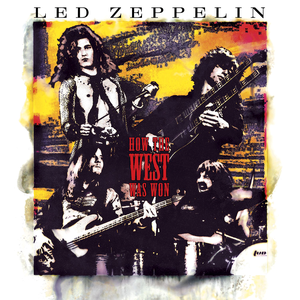Published on Jun 3, 2003
For fans of the late, lamented rock group Led Zeppelin, the
release of any new material (new, of course, meaning not
commercially released prior to their breakup in 1980) is cause for
celebration. It was reason enough to drop $70 for the four-CD
self-titled box set in 1990, which gave the world only two new
songs (one of which, “Travelling Riverside Blues,” was widely
bootlegged).
So being given
How The West Was Won, a three-CD set capturing Jimmy Page
and crew in two concerts from July 1972 (prior to the release of
Houses Of The Holy) should be enough to send Zep-heads into
near rapture. Indeed, this does supplant
BBC Recordings and the abysmal
The Song Remains The Same to become the live recording of
Led Zeppelin’s discography.
And, like Led Zeppelin, this set captures both the good and the
bad that was this group, leaving the listener both pleased with the
end results… and a bit of an empty feeling, as if something
else should have been included to make this release better.
Actually, throughout the first disc of
How The West Was Won (taken from shows in Long Beach and Los
Angeles), it feels like Page and crew can do no wrong. Even with a
bit of a distorted and sloppy opening to “Immigrant Song,” the
energy that the band pours into its instruments (and, in Robert
Plant’s case, his vocals) is a reminder to everyone just how
intense Led Zeppelin could be on stage. Sure, it might be the
millionth time you’ve heard “Stairway To Heaven” in some form, but
hearing it in this setting just feels right, as if you’re sitting
in the first few rows and are watching Page work his magic on his
Gibson double-neck.
What sets this first disc apart is that this is the first time
that Led Zeppelin has ever released any of their live acoustic
material – namely, the versions of “Going To California,” “That’s
The Way” and “Bron-Yr-Aur Stomp”. The interplay between Plant’s
vocals and the string work from Page and John Paul Jones speaks
louder than any 190-decibel blast from a Marshall stack could, and
makes me wish that more material like this would see the light of
day. (I’m still working my way through DVD — we’ll get to that
soon here on “The Daily Vault”.)
Disc two starts off well enough with “Dazed And Confused,” a
song which does seem to have a little more power when you can
actually see what Page and crew are doing. And while this version
tops the one that was on the album release of
The Song Remains The Same, nothing I’ve heard — even on
bootlegs — has topped the version that was on the film for sheer
kinetic energy.
Where things start to slip for
How The West Was Won is on “Moby Dick” — otherwise known as
John Bonham’s drum solo. Now, there is no denying that Bonham was
one of the most electrifying and powerful drummers in the history
of rock. But the visual of Bonham’s attacking his drum kit is a
major factor in this power, and just being given an audio
demonstration gets boring – especially when you have 19 minutes’
worth of skin pounding. If you never saw Led Zeppelin live or have
never seen the movie
The Song Remains The Same, you might not know that Bonham
would, at one point, drop his sticks and play his drums with his
hands. Visually, it’s powerful; audio only, it’s underwhelming.
The final disc of this set almost feels like it’s trying to
atone for the mistakes that “Moby Dick” made with this set — and
again, it feels like Led Zeppelin doesn’t follow the formula of
“less is more”. I know that “Whole Lotta Love” often got stretched
out to mammoth proportions, especially with Page’s theremin solo
(which seems like a bit of a waste this time) and the band’s dive
into the rhythm & blues that made up their backbone. But
sometimes, it feels like Zeppelin overplays their hand in this
regard, featuring, if I counted right, about 15 minutes’ worth of
roots worship. It just feels like a lot of overkill, especially
when there was no questioning the band’s roots or power by this
time in their career.
The game of “catch-up” concludes with a pretty standard version
of “Rock And Roll,” an early rendition of “The Ocean” (which is
still pretty tasty) and a final blues/roots number, “Bring It On
Home”. Again, it sometimes feels like Led Zeppelin are trying too
hard to justify their rights to play the blues, and this last track
almost seems to be anticlimactic.
Don’t get me wrong, any official release of live Led Zeppelin
material is always a joy, and
How The West Was Won is still very much a worthwhile
investment, even if it could have been pared down to a two-disc
set. But part of me has to wonder why Page selected this particular
show for release. There is, for example, a soundboard recording of
Zeppelin’s final show from Berlin in 1980. (I know… I have
it.) There is the series of recordings from Detroit that are known
as
Destroyer, possibly the best-known of the Zeppelin bootlegs.
One has to wonder just how much more material Page has in the
vaults, or if he’d even consider releasing a series of cleaned-up
bootlegs a la Frank Zappa. Until then, this will do just fine.
